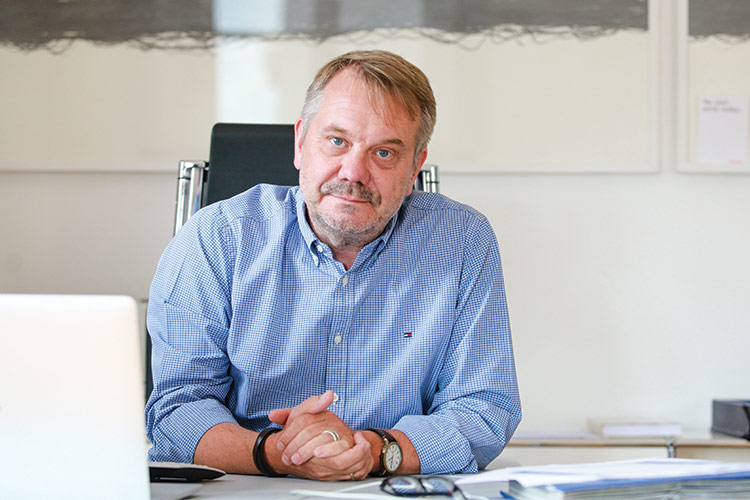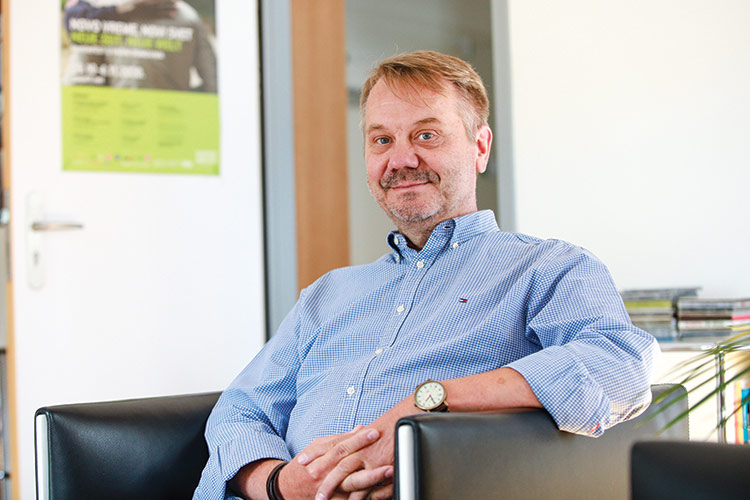“When I think about a dream project that could be done in the future, the first thing that comes to my mind is that we should organise a big party and concert on the occasion of Serbia entering the European Union”
Like other cultural institutions, Goethe-institute is facing lots of challenges during the still ongoing pandemic. Nevertheless, it has adapted to the new reality, establishing its COVID relief fund and changing the way projects are implemented. Here we speak to Goetheinstitute Director Frank Baumann to discuss various topics, including the importance of culture during a crisis, how to act against disregard for culture, relations between official institutions and the sphere of culture, and mainly the Goethe-institute’s past, current and upcoming projects.
During past months we’ve seen lots of analysis and discussion about the impact of COVID-19 on the economy, on education and even on international relationships. In your opinion, what is the most significant impact that the pandemic has had on the culture and creative sector?
As is known, all cultural events had to be cancelled in the previous period, all institutions in the field had to be closed and all artistic projects were postponed or cancelled. The same applied to the cultural and creative industry and, of course, to us at the Goethe-institute. That was the effect of 2020. We tried, like everybody else, to switch and change formats, but some of us cannot stand to hear the word “streaming” any longer, because it has become too much. Everything is streamed, everybody produces, but where is the audience?
If we reflect on the period behind us, what could be concluded about the importance of culture during a crisis?
If we’re talking about the lockdown situation and the complete shutdown that was unnecessary, my impression is that places of culture should be among the first to reopen, and not among the last. And the question is: with which institutions or spheres of live do we compare culture and cultural institutions? The importance of culture is evident, as it can help people overcome their fears. And fear is palpable when a life-threatening virus is waiting just around the corner. The problem is that there are people who regard art, music, literature, and film as something almost superfluous, something you can easily do without, which is wrong. All these people who see the fundamental relevance of culture as being in line with leisure activities, comparing it with fitness studios and casinos, must allow themselves to be accused of being too lightly discrediting everything that defines our democracy. Because culture is essential in pandemic times.

In Germany, we have the term “Systemrelevanz” – what is relevant for a society and what is not. And culture was obviously not relevant.
There were a bunch of artists who used this and said: “We ARE systemically relevant”. It cannot be that system relevance includes only that which is countable and that which is measured in prices, numbers and values. The filling station is relevant, but the cinema is relevant as well, for other reasons.
How can we combat the serious undermining of culture that you mention?
By speaking about it further and, as a cultural institution, by trying to reopen platforms, rebuild stages, make even bigger projects, increase the budget and support local artists and the culture sphere.
The Goethe-institute and the German Federal Foreign Office, together with some other organisations, established the International Relief Fund which has, for the second time, provided support to mainly NGOs in dealing with the negative consequences of the coronavirus pandemic.
And we could support local NGOs not just by coproducing projects, but by supporting them in a tangible, budgetary way, including by purchasing the technical equipment that they need or, for example, covering staffing costs. This fund is present in several countries – Serbia, Montenegro, North Macedonia and a couple of others – and it could serve to prove that this is situation where even dinosaurs like the Goethe-institute are able to react quickly and adequately.
The importance of culture is evident, as it can help people overcome their fears. And fear is palpable when a life-threatening virus is waiting just around the corner
At least two of your projects – “Playing Narratives” and the platform “Next Generation” – are aimed towards the youth. Could you tell us more about this and the responses you’ve received?
“Playing Narratives” is a project that targets young professionals and those who want to become professionals in the gaming field. It is about bridging the gap from a comic story to a game i.e., how to develop it. The idea originated with our French colleagues and is our joint project. For us, it was interesting to see how immense the support was from Serbian companies that operate in the gaming business. These companies have been really interested, because they also know that they can get a grip on these talented youngsters through such a project.
“Next Generation” is the creative platform that we established in 2010 in order to deepen our communication with the youth. We have been focused on a few projects over the last several years. In cooperation with visual performance artist Darko Dragićević from Berlin, we realised the projects – “Failure as Practice”, “Lie & Theft as Practice” – the book will be presented soon – and we are now in the third phase, “Inequality as Practice”. The young artists who participate in this platform have a possibility to attend workshops with Darko and other visiting professors, mainly from Berlin, sharing the specific experience of connection in the collective body and working on a given topic.

Before the pandemic, this project was well noted in Berlin, and the cooperation we’ve already established with the Tanzfabrik Festival will continue. For us, this means the building of bridges between Berlin and Belgrade.
Among other programmes within the scope of the “Next Generation” platform, we currently have a programme in which a group of ten young artists and visual artists are dealing with the issue of commons. The topic they are working on is the institution of the future.
Speaking in some previous interviews, you mentioned that you see “a certain threat wherever culture and history are presented (and financed) top-down.” How would you describe the relationship between officialdom and the sphere of culture?
The relationship between official, state institutions and the cultural scene is always asymmetrical. That happens because the first one should partly finance the second, which is something that’s demanded in our contemporary societies. We have the right to demand this – that the state finances culture. But, of course, it is not just a deal like any other, because in culture you never know what you’ll get. In my eyes, that is something that should be accepted as being part of the game. That’s because culture is not financed for those who pay for it, but for society as a whole. I’m now speaking about artistic freedom, which is a very important value. We have the idea that art is basically allowed to do everything, which doesn’t mean that it must do everything. But it is generally allowed to do so. I then found this quote by a former German constitutional judge and high-ranking lawyer: ‘the liberal and secularised state lives on the condition that it cannot guarantee itself’. This is an interesting philosophical approach we should reflect on.
“Playing Narratives” is a project that targets young professionals and those who want to become professionals in the gaming field. It is about bridging the gap from a comic story to a game i.e., how to develop it
One of the Goethe-institute projects is the transnational exhibition “Missing Stories. Forced Labour under Nazi Occupation. An Artistic Approach”, as an issue that presents one of the forgotten memories in regional history education. What have reactions to the exhibition been like and are you planning similar projects in this field in the future?
We staged this exhibition in cooperation with the EVZ foundation (The Foundation Remembrance, Responsibility and Future) and the preparatory phase alone lasted almost three years.
We are very satisfied that we could continue this exhibition’s international tour. Namely, the initiative originated in Belgrade but included five other cities – Novi Sad, Podgorica, Tirana, Augsburg and Berlin – and also four curators and around 10 artists who dealt with the issue of forced labour under Nazi occupation. We consider this topic as being very important and so many families have their personal stories, but we noticed that those who were impacted very rarely speak about it, nor is that present in the public sphere.
That’s why the exhibition is entitled “Missing stories”. It encompasses different perspective from several countries. It has to date been organised in Belgrade, Novi Sad, Podgorica and Tirana. Every place has brought something that was peculiar to that city, and the accompanying programmes have been different. Hopefully, the exhibition will be presented in Augsburg and should end its tour in Berlin.
What are your plans for the coming months?
We are once again collaborating with the Belgrade Jazz Festival and the BITEF festival. We also have our own Goethe Film Festival, organised together with KC Grad.
I have to say that, unlike in the other countries where I’ve worked, Serbian partners always know who they would like to present and invite from Germany. Awareness of what is going on in Germany is at a very high level here.
Is there any (dream) project that you would really like to do, in terms of cultural exchanges between our countries, but which you have not yet implemented?
When I think about a dream project that could be done in the future, the first thing that comes to my mind is that we should organise a big party and concert on the occasion of Serbia entering the European Union.